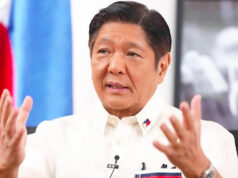Rappler reporter barred because of ‘lost trust’ — Palace spokesman
By Arjay L. Balinbin
PRESIDENT Rodrigo R. Duterte had banned Rappler.com’s senior reporter Pia I. Ranada from covering her assigned beat Malacañang due to “loss of trust,” according to Presidential Spokesperson Herminio Harry L. Roque, Jr.
In a text message to BusinessWorld on Wednesday morning, Feb. 21, Mr. Roque confirmed his earlier statement that Mr. Duterte had “lost trust in Ms. Ranada.”
“Yes, and the decision of SEC [Securities and Exchange Commission] that Rappler is already dissolved,” the spokesman added when asked about the President’s basis for his decision.
In an official statement, Mr. Roque said: “[U]nder the Rules of Court, judgments and final orders of quasi-judicial agencies, including the Securities and Exchange Commission (SEC), are not stayed while on appeal with the Court of Appeals (CA), unless the CA directs otherwise. In Rappler’s case, no such directive from the CA has been issued.”
Mr. Roque noted that Malacañang “did not implement the SEC decision at once.”
“We could have earlier disallowed Rappler’s Palace beat reporter, Pia Ranada, from entering Malacañang when the SEC decision was handed down if our intent is to infringe press freedom. However, we allowed Ms. Ranada to continue performing her work assignments unimpeded, notwithstanding that trust with the news source had already been adversely affected, in the hope that this would be restored,” the spokesman added.
For his part, Human Rights Watch (HRW) representative Carlos H. Conde said: “It could portend a broader assault on journalists and news organizations, whose critical watchdog role has magnified the government’s poor human rights record, from extrajudicial killings of thousands of alleged drug dealers and users to conflict-related abuses in the south.”
Sought for comment, Professor Luis V. Teodoro of the University of the Philippines-College of Mass Communication said in a phone interview that “there are government officials who have certain attitudes towards reporters….I think even those they don’t like, they should tolerate because that’s part of their responsibility in making sure that the public get the information that they need.”
“The public needs information from various perspectives. There’s what we call ‘market of ideas.’ Thus, it’s important to allow reporters to cover even if you don’t like them,” Mr. Teodoro added.
Asked how the President’s treatment of Ms. Ranada may impact on other journalists, Mr. Teodoro said:” Some journalists may now be hesitant to ask tough questions….”
Mr. Teodoro argued as well that the SEC ruling on Rappler.com is still “pending” at the Court of Appeals (CA). “No final decision yet, so I don’t know if [the President] can use that as a reason.”
MASS MEDIA
In its 68-page petition for review, Rappler argued that the company “is not engaged in the business of ‘Mass Media’ as contemplated by Section 11 (1) of Article XVI of the Constitution, which states: ‘The ownership and management of mass media shall be limited to citizens of the Philippines, or to corporations, cooperatives or associations, wholly-owned and managed by such citizens.’”
“As such, neither Rappler nor RHC [Rappler Holdings Corporation] is obligated to comply with this provision or be held liable under it,” the petition noted.
Rappler identified itself in its petition as the “Philippines’ first all-digital news organization.”
According to Mr. Teodoro, a digital media organization is “still a mass media organization because when we speak of mass media, we are referring to the kind of people that the media reach. If you are online, you reach a mass audience.”
“The definition of mass media is very clear. It says any medium that reaches a large number of people. The audience of online news sites is even bigger than the audience of print media. The old definition of mass media applies,” he explained further.
‘CONDUCT UNBECOMING’
Meanwhile, Presidential Security Group (PSG) Commander Brigadier-General Louie Dagoy criticized Ms. Ranada for her encounter with PSG Corporal Marc Anthony Cempron when he barred Ms. Ranada from entering the Palace last Tuesday.
“I didn’t like what Pia and ABS-CBN did. Why did they have to force my soldier to speak when he already told them that he had nothing to say?” Mr. Dagoy said in an interview with Presidential Communications Operations Office (PCOO) Assistant Secretary Esther Margaux ‘Mocha’ J. Uson which she shared on her Facebook page.
“Pasalamat kayo at hindi kayo sinaktan sa pambabastos na ginawa niyo (Be thankful you were not hurt for your rudeness). It’s very rude on their part, you should have done it (by) calling the proper person,” Mr. Dagoy added.
In an official statement, Rappler said: “We denounce the threat made by the commander of the Presidential Security Group against Rappler and its Malacañang reporter Pia Ranada. Dagoy’s statement is conduct unbecoming of an officer and a gentleman….We ask General Dagoy to apologize for his outburst…”
For its part, the Malacañang Press Corps (MPC) in a statement on Wednesday afternoon said: “Rappler will remain a member of the Malacañang Press Corps (MPC) unless the Court of Appeals upholds the decision of the Securities and Exchange Commission (SEC) revoking its registration.”
“MPC, an independent organization of journalists regularly covering the President and Malacañang activities, asserts its prerogative to accept, suspend or revoke membership to the body,” the group also said, adding:
“While we respect the discretion of Malacañang to set accreditation rules for presidential events, we deplore any arbitrary attempt to bar access and harass reporters performing their duty as an independent monitor of power and guardian of public interest.”
“We also urge Malacañang to communicate properly the grounds for such restrictions.”



